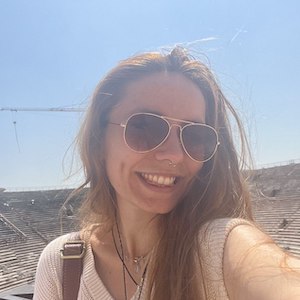Our testimonials: Bianca

Our testimonials: Bianca
Meet Bianca from Brazil
Student of Applied Sciences to Cultural Heritage Materials and Sites
"I was instantly captivated by how Unipd presented itself as a university whose doors were opened for international students"

About myself
Happy to meet you! I am Bianca, a Brazilian historian and (almost) archaeologist who is passionate about everything related to history and humanities. I graduated in 2021 in History, at the Federal University of Santa Catarina, and then started to plan to continue my education abroad – a dream that became reality in 2022. I am now a second-year student of the Applied Sciences to Cultural Heritage, Materials and Sites degree programme, and this experience has been everything I hoped it would be and much more. I had the chance to participate in an archaeological field school in Crete, organised by the University of Padua, and I was also part of an archaeological excavation in central Italy this summer. Besides being a full-time student, I am now also proud to be part of the Buddy Programme, a UniPD initiative in which senior students can tutor first-year international students in the beginning of their educational journey here in Padua. Helping prospective students by sharing my experience is a passion of mine!
Why did you choose the University of Padua and the Applied Sciences to Cultural Heritage, Materials and Sites degree programme?
Studying and living abroad has always been the biggest goal of my academic journey. When I was halfway through my bachelor’s degree, I started digging the internet in search of opportunities to continue my educational journey, but I must say that, at the time, pursuing a master’s degree abroad wasn’t very popular in my country. I felt like I was entering a complete unexplored field! When I eventually found out about the programmes offered for international students by the University of Padua, I was instantly captivated by how UniPD presented itself as a university whose doors were opened for international students, and that would provide the support I needed. I wasn’t wrong: the International Office always offered a lot of assistance, from the user- friendly interface of the application webpage to the monthly webinars focussing on the steps required to complete the enrolment and arrive in the charming city of Padua.
As for my master’s programme, I always knew I wanted to pursue a career as an archaeologist, and my background in History was my first step in this professional journey. However, even though my Bachelor’s offered me a great critical perspective and theoretical approach towards History and humanities, which are key skills for any professional in the field of Cultural Heritage, I still lacked a great deal of the practical and scientific knowledge that would also be important for my career. And the programme of Applied Sciences to Cultural Heritage, Materials and Sites was exactly what I felt I needed: the interdisciplinary approach that combines knowledge from geology, chemistry, physics, among other scientific disciplines, to analyse archaeological artefacts and sites, as well as historical buildings and works of art, would perfectly complement my education, and offer the skills I still lacked.
What are the main features of your degree programme?
The Master’s of Applied Sciences to Cultural Heritage, Materials and Sites is a pretty new programme (I’m actually part of its second class ever!), but with a very innovative approach. Its goal is to combine knowledge from geology, chemistry, physics and material sciences to study the composition, technology and conservation techniques related to archaeological artefacts and sites, as well as historical buildings, paintings, sculptures, etc. We are taught by a team of esteemed professors with impressive curriculums and achievements on the application of sciences to Cultural Heritage. The class is not only a multi-cultural environment made up of international students from all over the world, but a multi-disciplinary space as well: we are a group of archaeologists, architects, historians, engineers, chemists… as you can imagine, the discussions we have in class are truly enriching!
What do you like best about you programme?
I love challenging myself into learning something new, and from the very beginning, I knew this programme would be a challenging experience. Coming from a humanistic background, I needed to immerse myself into some scientific concepts and discussions that were very new to me and required a lot of focus and study. So far, this programme is providing me with competences that will surely distinguish me in my professional life, preparing me to become an archaeologist who is aware of both the humanistic and the scientific aspects of this career. This is the highlight of the programme to me: it complements my formation and enables me to thrive on my professional life.
What do you like most about the City of Padua and why? What funny things have you experienced since you arrived here?
How can I start? Padua is a charming city that offers so many beautiful places and things to do! Its medium size (not too small, not too big) is perfect for me: you can go anywhere in the city by just biking around, but also find so many activities to do in your free time. Even if it’s not that big, it took me some time to learn how to get around the city centre, so my colleagues would always laugh about the fact that I would usually get lost before finding my way to the University. It’s not Padua’s fault, of course – you can put the blame on my lack of urban orientation skills. But well, at least I found some beautiful places while I was lost wandering around the city!
Tell me a bit about student life in Italy. What do you do for fun and what are your favourite places to spend time?
Padua is a very lively and student-centred city, so it surely doesn’t lack places to have fun! In my daily life, I love biking around the town and its natural surroundings, and visit some of Padua’s beautiful spots – like the Giardini Dell’Arena, a park in the city center that once hosted an ancient Roman arena, and the Eremitani Chapel, home of a series of frescoes of keen importance for Italian art. Speaking of that: if you are a fan of history, Padua is definitely the place to be! I love spending my Sundays exploring the historical centre, the numerous churches and basilicas with frescoes and other medieval works of art, and the many museums you can find downtown. I also like to spend the sunny days in the parks, having some picnics or a spritz with my friends. Padua is also only one train away of many other magical cities of Veneto, like the famous Venice and Verona, so you can easily explore other places as well!
Wha is your plan when you graduate?
My main goal is to apply the knowledge I am acquiring here to make a change in my career as an archaeologist. I would love to work for institutions that help preserving, valorising, and protecting Cultural Heritage, like museums or governmental organizations. I truly hope to be able to apply all the knowledge and experience I’ve been acquiring to study Brazilian archaeology, which unfortunately still struggles with lack of valorisation and underfunding. I would also love to take further steps on my educational journey, so pursuing a PhD and an academic career is in my plans as well, for sure!
MEET OUR TESTIMONIALS
Many students shared their experiences at the University of Padua.
Find out their stories!


